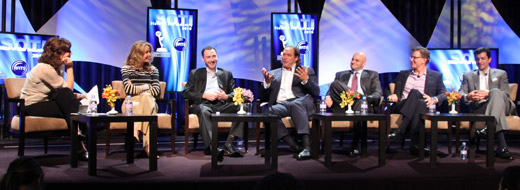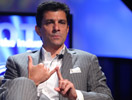
by Chris Davison, chris@lthmedia.com
The 2010 State of the Industry luncheon took place June 23rd at the Beverly Hilton and opened with HRTS President Kevin Beggs noting that the television industry has changed significantly since the last SOTI luncheon in 2007. The goal being to take a close look at the overall health of the business from various viewpoints, Beggs introduced six panelists representing a true cross-section of our industry: Leigh Brecheen, partner in the firm of Bloom Hergott Diemer Rosenthal LaViolette Feldman Schenkman & Goodman, LLP; Paul Lee, President of ABC Family; Steve Mosko, President of Sony Pictures Television; Kevin Reilly, President of Entertainment at Fox Broadcasting Company; Chris Silbermann, President of International Creative Management; and Tim Spengler, President of Initiative, North America.
 Moderating this panel of industry heavyweights was THR Editor-at-Large Kim Masters, who began by noting that Conan O’Brien and Oprah have recently established themselves in the cable world. Masters asked Leigh Brecheen about Conan’s decision to go to TBS and Leigh said that it was a learning experience for all involved. She added that everyone on Conan’s team initially thought that they’d end up at FOX, but “like a lot of networks with a single revenue stream, they’re struggling to make things work”. TBS was very aggressive, they were willing to spend the money and they really wanted Conan to be there.
Moderating this panel of industry heavyweights was THR Editor-at-Large Kim Masters, who began by noting that Conan O’Brien and Oprah have recently established themselves in the cable world. Masters asked Leigh Brecheen about Conan’s decision to go to TBS and Leigh said that it was a learning experience for all involved. She added that everyone on Conan’s team initially thought that they’d end up at FOX, but “like a lot of networks with a single revenue stream, they’re struggling to make things work”. TBS was very aggressive, they were willing to spend the money and they really wanted Conan to be there.  Kim asked a follow-up on Conan’s expected ratings on cable, leading Kevin Reilly to interject that the decimal will be on the left side of the number and not the right, grinning as he jokingly added “I don’t like Conan, he’s a bad guy”. Insofar as broadcast v cable, Reilly said “Conan going to cable is yet another progression in the decades-long movement to increasing cable”.
Kim asked a follow-up on Conan’s expected ratings on cable, leading Kevin Reilly to interject that the decimal will be on the left side of the number and not the right, grinning as he jokingly added “I don’t like Conan, he’s a bad guy”. Insofar as broadcast v cable, Reilly said “Conan going to cable is yet another progression in the decades-long movement to increasing cable”.
 Masters asked Paul Lee about branding and he said “I’ve come to believe that brands are critical” since a “brand is a promise, it’s not just that demo it’s how that demo wants to watch television”. ABC Family’s audience is Millennials, a demo that Lee described as being warmer and more optimistic, and so his network’s programming reflects their outlook. As compared to broadcast, Lee said that cable has an easier job focusing on an audience and building a specific brand, they don’t have to be all things to all people.
Masters asked Paul Lee about branding and he said “I’ve come to believe that brands are critical” since a “brand is a promise, it’s not just that demo it’s how that demo wants to watch television”. ABC Family’s audience is Millennials, a demo that Lee described as being warmer and more optimistic, and so his network’s programming reflects their outlook. As compared to broadcast, Lee said that cable has an easier job focusing on an audience and building a specific brand, they don’t have to be all things to all people.
 Chris Silbermann responded to a question about writers’ salaries and creative freedoms in broadcast v cable by saying that “as agents, our job is to always balance creative passions, creative freedoms and creative desires with financial realities”, so they’re always walking that line. He added that a participant may have more creative freedoms in cable but will be better able to monetize back-ends in broadcast.
Chris Silbermann responded to a question about writers’ salaries and creative freedoms in broadcast v cable by saying that “as agents, our job is to always balance creative passions, creative freedoms and creative desires with financial realities”, so they’re always walking that line. He added that a participant may have more creative freedoms in cable but will be better able to monetize back-ends in broadcast.
Sony has many cross-platform entertainment initiatives and so Masters asked Steve Mosko about the intersection of the television and video gaming worlds.  Mosko said that “PlayStation has 41 million registered users around the world, 24 million in the United States”, adding that while the console has mainly been known as a gaming platform, in the future it’ll be known as more of a content platform as well. Masters asked a follow-up about the impact that these new platforms will have on the TV schedule and Mosko hit a reassuring note by saying “the average person watches 158 hours of television per month and it’s going up” adding that “the television viewing experience in the home has never been better, sound quality’s good, picture is phenomenal and 3D is coming”. With the television set being the center of attention, there’s great opportunity for everyone in the industry.
Mosko said that “PlayStation has 41 million registered users around the world, 24 million in the United States”, adding that while the console has mainly been known as a gaming platform, in the future it’ll be known as more of a content platform as well. Masters asked a follow-up about the impact that these new platforms will have on the TV schedule and Mosko hit a reassuring note by saying “the average person watches 158 hours of television per month and it’s going up” adding that “the television viewing experience in the home has never been better, sound quality’s good, picture is phenomenal and 3D is coming”. With the television set being the center of attention, there’s great opportunity for everyone in the industry.
 Kevin Reilly agreed, saying that as for the future of the television, “I’m actually more optimistic now” and that some lessons have been learned about the new media ideal of anything, anywhere, anytime. Reilly said that going forward “I don’t think that ubiquity is necessarily good, and I think we’re now beginning to get the genie back in the bottle”. Consumers may want everything for free but “I’d like to go into Barney’s and help myself to a new suit, it just doesn’t work that way”.
Kevin Reilly agreed, saying that as for the future of the television, “I’m actually more optimistic now” and that some lessons have been learned about the new media ideal of anything, anywhere, anytime. Reilly said that going forward “I don’t think that ubiquity is necessarily good, and I think we’re now beginning to get the genie back in the bottle”. Consumers may want everything for free but “I’d like to go into Barney’s and help myself to a new suit, it just doesn’t work that way”.
Tim Spengler noted that CPMs on the broadcast side are still higher than on the cable side but that cable numbers are moving up. As to the future of television, he said that right now advertisers still pay for ratings albeit in different forms such as C3. In future, Spengler predicted that newer and better data will make it possible for advertisers to pay for responses, for ad-driven interaction with consumers, and so the primary question will not be as to what’ll pull the most eyeballs but rather “what is going to perform better?”
Next year will see labor negotiations for SAG, the DGA and the WGA and so Masters asked Silbermann for a prediction. He pointed out that there may be a lack of trust between talent and the buyers of talent but that a lot of progress was made after the last strike, that people have been communicating better in order to address the issues that the drove the strike and so “I am optimistic that things will progress” as the guilds and companies continue their dialogue. Brecheen agreed, adding that transparency is key and that things could go smoothly if it is “less about dogma and more about actual data”.
 Looking toward the horizon, Spengler sounded a cautionary note by pointing out that in order to put more money into new products and services there must be more money coming in from advertisers. This has not however been this case, Spengler saying that “revenue in television will be off in 2010 versus 2007, it is less than it was three years ago and the business will have to figure out where new money is coming from”. His agency representing talent in film, TV, music and publishing, Silbermann noted that “TV is the best business of them all right now being flat” since other areas of the entertainment business have been hit hard, leading Masters to quip that “flat is the new up”. Television revenues may not have grown in absolute terms but in relative terms they’re very healthy.
Looking toward the horizon, Spengler sounded a cautionary note by pointing out that in order to put more money into new products and services there must be more money coming in from advertisers. This has not however been this case, Spengler saying that “revenue in television will be off in 2010 versus 2007, it is less than it was three years ago and the business will have to figure out where new money is coming from”. His agency representing talent in film, TV, music and publishing, Silbermann noted that “TV is the best business of them all right now being flat” since other areas of the entertainment business have been hit hard, leading Masters to quip that “flat is the new up”. Television revenues may not have grown in absolute terms but in relative terms they’re very healthy.
The final word came from Reilly, who spoke of the power of television content, for which “people still have a voracious appetite, which is hopeful”. No matter the platform or business model, people want to watch television and so the future is bright.



